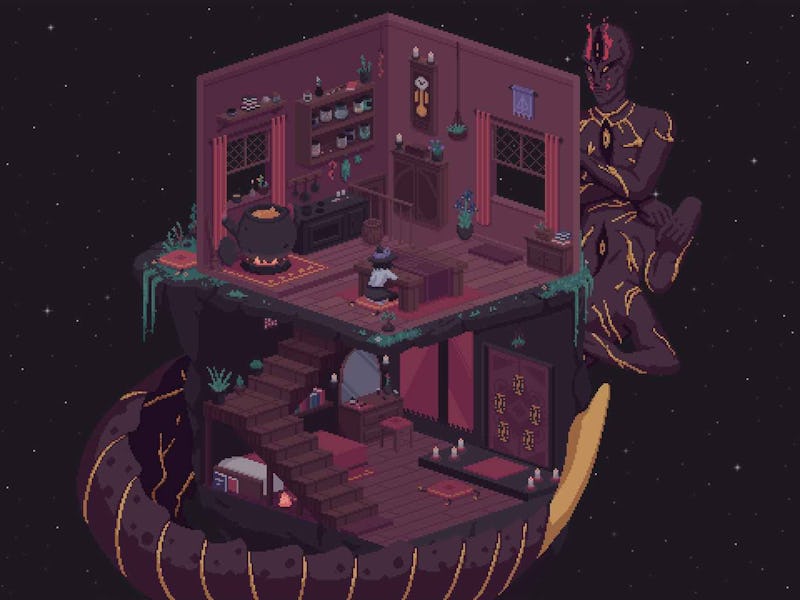Deck-Building Gets a Tarot-Inspired Twist in The Cosmic Wheel Sisterhood
Season of the witch.

I’ve never been one to put any stock in tarot — or fortune-telling of any kind for that matter. I can only think of two times I’ve ever had a tarot reading myself, once from a friend while drinking at their apartment and once during the renaissance faire. But after playing The Cosmic Wheel Sisterhood, I am ready to fully get into tarot.
That’s because the witchy indie deck builder uses its own version of the card fortune system to push forward a fascinating narrative in a beautifully realized world. As autumn turns the leaves orange and the air crips, The Cosmic Wheel Sisterhood is the perfect game to evoke the magic of the season.
The Cosmic Wheel Sisterhood begins with a series of life-altering choices. The first is made by protagonist Fortuna, a witch 200 years into a 1000-year exile from her coven, who must decide whether to summon Abramar — an all-powerful being known as a behemoth. She does, and Abramar strikes a deal with Fortuna to give her a new deck to replace the tarot set her coven leader destroyed at the beginning of Fortuna’s exile. Fortuna’s acceptance of this deal makes her a criminal of the highest degree as colluding with behemoths is forbidden.
The next major choice falls on the player. To seal the pact with Abramar, Fortuna must sacrifice something of immense value. The player chooses to give up either Fortuna’s immortality, her coven, or the life of the person she loves most. Once that choice is made Fortuna’s fate is sealed, as is the player’s. At the end of Cosmic Wheel’s roughly eight-hour narrative, Abramar will collect his price.
In its opening hour, Cosmic Wheel deftly establishes its stance on the central themes of fate versus free will. The player and Fortuna have chosen their paths, but now their future is determined and there is nothing that can be done. Whatever happens next will only bring the inevitable end closer to fruition.
The game’s central mechanic, Fortuna’s new deck of fortune-telling cards, continuously beats this theme into the player. Due to some witch bureaucracy, Fortuna is granted the right to have visitors. From this point on, other witches (including old faces from Fortuna’s past) will come seeking advice in the form of readings.
Every card is unique to the player who crafted it in The Cosmic Wheel Sisterhood.
Readings consist of pulling a card from your deck and using it to read into the past, present, or future concerning the question posed by the visitor. But fortune-telling is not a precise art, and Fortuna is given room to interpret the cards. As such, when you pull a card, Cosmic Wheel gives you multiple dialogue options. Narratively, the player needs to be wary of what interpretation they choose to speak into existence, as Fortuna’s card reading will lock the future into place, just as Fortuna and the player are locked into their fate. It gives every reading a weight and responsibility that the player must consider.
This duty is even heavier on the player considering the deck used for readings is unique for every playthrough. This new deck does not fall into the traditional major and minor arcana of a normal tarot deck, rather Abramar lets Fortuna craft her own cards to bring about even stronger power. Crafting each card requires players to choose three components, each with their own meanings, and place them on a card to form the deck. This makes every deck unique to the player who created it. This also means that the readings possible from that deck, and their consequences, are the responsibility of the player.
The Cosmic Wheel Sisterhood’s blending of deck-building, visual novel narrative, and player choice makes it a unique indie unlike anything else.